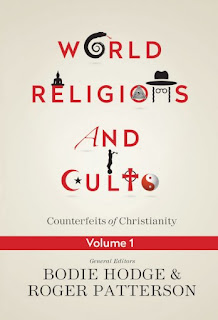This is a teacher's guide to use alongside World Religions and Cults (a 3 volume series) for grades 11-12. While the books themselves are an eye-opening, insightful, and heart-opening series to reach those who need to hear the Gospel message, one can also use this convenient teacher's guide to organize and follow through the series; a resource to add value to learning. If followed as structured, this is a one year course, offering 1 full high school credit. Assignments are laid out as a 5-day/week schedule (which is flexible based on teacher and student). It's also broken down by quarter and semester. Although the book is called a teacher guide, by 11/12th grade, students are typically self-guided. The book itself is a complete set of worksheets (based on student's reading), quizzes and tests. If purchased as a complete set through www.masterbooks.com, there is a timeline chart that is included that give a visual representation to the origins of various religions. I haven't seen it in person, but it's on my wishlist; appears to be another insightful resource.
Sunday, August 5, 2018
Book Review: World Religions and Cults, Vol. 3 ~ Bodie Hodge & Roger Patterson
As previously reviewed, World Religions and Cults is a 3 volume set. Volume 3 focuses on Atheistic and Humanistic Religions. Atheism, Agnosticism, Secular Humanism, Nazism, Scientology (Thetanism/Church of Scientology/Hubbardism), Communism, Postmodernism, Epicureanism and Evolutionary Religions, Dualism, Christian Syncretism with Evolution and other belief systems (compromise), Religion of Naturalism, Materialism, and Empiricisim each have their own chapters.
Several appendices at the end of Volume 3 offer invaluable additional information. Learn about the Bible versus other religious books, what a martyr is, if morality is possible for a Secularist, what the intelligent design movement is, how evolutionary humanism destroys, how to respond to Atheist propaganda and skeptics, and what Evolution (with a capital E) means. Most importantly, for those who need this question answered, "What must I do to be saved?" has its own chapter. What it all comes down to is knowing the Truth because your life (literally) depends on it.
Book Review: World Religions and Cults, Vol. 2 ~ Bodie Hodge & Roger Patterson
World Religions and Cults, Volume 2, is focused on Moralistic, Mythical and Mysticism Religions. It's a continuation of Volume 1, which you can read about here. The religions, philosophies and cults discussed in this book are as follows: The New Age Movement (Pantheism, Monism), Taoism, Hinduism (Hare Krishna), Jainism, Sikhism, Paganism, Voodooism, Wicca & Witchcraft, Druidism, Animism (Spiritism), Egypt's Ancient Religion, Norse & Germanic Mythology, Syncretism in Latin American Religions, Greek Mythology, Stoicism (Epicureanism), Shinto, Buddhism, Confucianism, and Unitarian.
Understanding the origin of countless world religions is key to understanding the meaning behind their teachings, beliefs and practices. Origins are discussed, including the origin of Christianity. Chapter 22 is dedicated to helping Christians share the Gospel message with the understanding of where origins and teachings differ. Appendices at the end are a tremendous resource. Appendix 1 offers insight into reaching out to various religions with the Gospel message. Appendix 2 is a logical expose on the irrationality of Atheism, polytheism, Deism, and Unitarianism.
Book Review: World Religions and Cults, Vol. 1 ~ Bodie Hodge & Roger Patterson
World Religions and Cults is a 3-volume series of books, each divided into a subcategory. Volume 1 is a 425 page book that deals with counterfeits of Christianity. The religions discussed within its covers are: Roman Catholicism, Eastern Orthodoxy, Islam, Jehovah's Witnesses, Judaism, Mormonism, The Baha'i Faith, Deism, Satanism, Freemasonry, Zoroastrianism, Worldwide Church of the Creator (The Creativity Movement), and Moonies/The Unification Church.
This is more than a book series that discusses the differences between religions and the whys behind varying practices. Its basis is from a presuppositional apologetics stance; God's Word is the absolute authority. Hodge and Patterson detail the origins of religions and take on secular religions (in another volume). In the most basic of terms, World Religions and Cults is separating God's Word and Man's Word. The reader will discover what defines various world religions, lesser-known religions, cults, and philosophical systems. Understanding worldviews and the fact that everyone holds presuppositions is key to seeing viewpoints of others and testing everything based on God's Word.
Subscribe to:
Comments (Atom)




